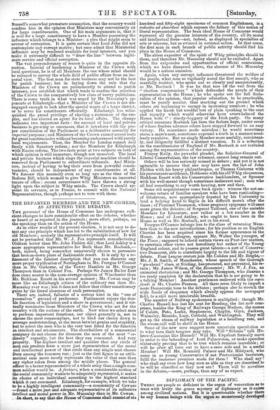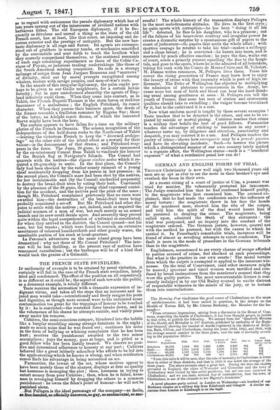DIPLOMACY OF THE PACIFIC.
THERE are people so deficient in the organ of veneration as to treat with levity the grave mystery of diplomacy as it exists among civilized nations. But it is questionable whether there be any human beings with the organ so monstrously developed
as to regard with seriousness the pseudo diplomacy which has of late years sprung out of the intercourse of civilized nations with barbarous tribes. The old European diplomacy, if it be fre- quently as frivolous and unreal a thing as the state of the old French court, has at least, like that court, an imposing and de- corous exterior and the prestige of antiquity. But the new bar- baric diplomacy is all rags and flutter. Its agents are extempo- rized out of grubbers in mummy tombs, or mechanics sanctified by the conventicle and sent forth to teach the heathen what they scarcely comprehend themselves, or the scattered remnants of such sage colonizing experiments as those of the Celtic Ca- cique of Poyais, or judicious trading undertakings like those of the South American mining companies. Its code is a strange melange of scraps from Jean Jacques Rousseau and "marrows" of divinity, eked out by moral precepts excogitated among whalers, traders with savage peoples, and men-of-war's men. In the annals of this irregular diplomacy, the palm ought per- haps to be given to our Gallic neighbours, for a certain heroic ferocity ; but in pure unredeemed absurdity the agents of Eng- land infinitely excel them. When they come into contact, as in Tahiti, the French Dupetit Thouars is the stern baron or reckless buccaneer of a melodrama ; the English Pritchard, its comic character. When they pursue their business apart, the deeds of the former resemble a feuilleton romance by Eugene Sue ; those of the latter, an Adelphi comic drama, of which the lamented Reeve might have been the hero. The curtain appears to have fallen for a time on the military glories of the French in Oceania. The solemn recognition of the independence of the half-dozen rocks to the North-east of Tahiti —leaving the victorious French to keep the " drowned archipe- lago" on the other side of the island afloat as a reward for their valour—is the denouement of that drama ; and Pritchard reap- pears in the farce. The Juno, 28 guns, is suddenly summoned by the ex-missionary Consul from Tahiti to vindicate the honour of the British flag at Navigator's Islands. The Consul had quarrels with the natives—the dignus vindice nodus which it re- quired a 28-gun-ship to untie. In the first place, the Consul's lady had been shocked by the rather scanty raiment of a young chief accidentally dropping from his person in her presence : in the second place, the Consul's mare had been shot by the natives, for her irreclaimable and (by the Consul) unchecked propensity to destroy the bread-fruit trees by eating their bark. Convinced by the presence of the 28 guns, the young chief expressed contri- tion for the accident, and the natives paid the price of the mare ; though Mr. Pritchard complained grievously that no costs were awarded him—the destruction of the bread-fruit trees being probably considered a set-off. But Mr. Pritchard had other dis- putes to settle with the natives ; not, indeed, such as required the Judicial acumen of a man of war, but such merely as an armed launch and its crew could decide upon. And assuredly they proved quite within the legal comprehension of a tribunal so constituted; for when they arrived in the district, the Consul opened—not his case, but his trunks ; which were found to contain an extensive assortment of coloured handkerchiefs and other gaudy wares, the unsaleable portion of his stock at head-quarters. La Perouse's adventures on the same island group have been dramatized : why not those of Mr. Consul Pritchard? The inte- rest will be less thrilling, as the present race of natives have renounced cannibalism ; but the burlesque will be of a kind that would task the genius of a Grimaldi.



























 Previous page
Previous page